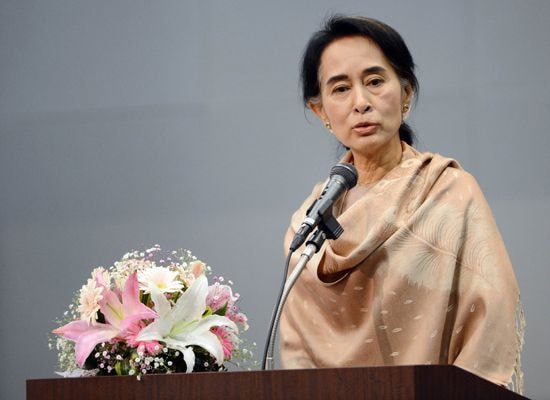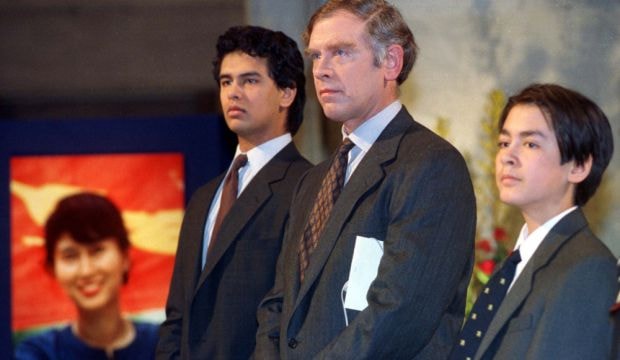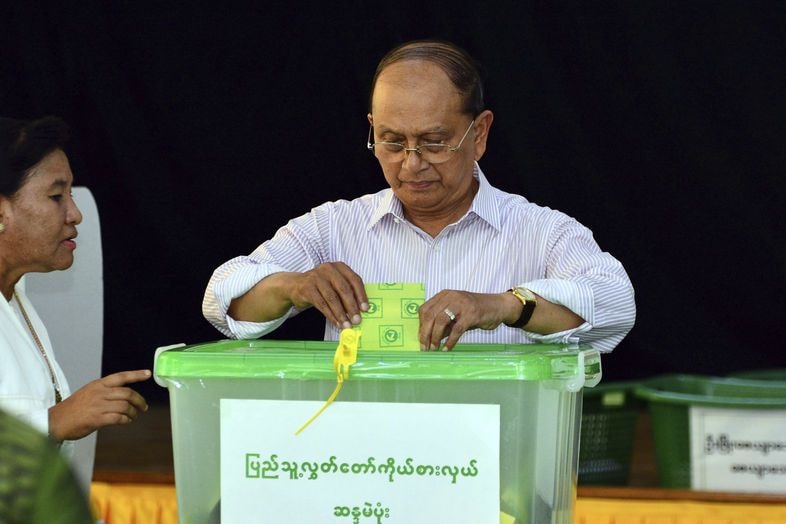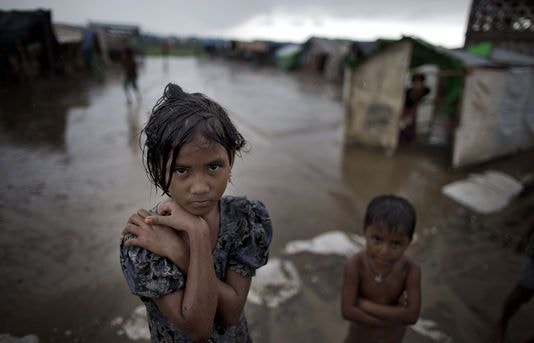The Past, Present and Future of Lady Myanmar
(Baonghean) - Aung San Suu Kyi - leader of the National League for Democracy (NLD), Myanmar - is a figure attracting special attention from international public opinion. Besides the resounding victory with the NLD at present, the life story and future political career of the Myanmar Lady have also become the focus of the media in recent days.yes
Aung San Suu Kyi was born on June 19, 1945, in Rangoon (now Yangon), the daughter of General Aung San, who founded the modern Burmese army and negotiated Burma's independence from Britain in 1947. He was assassinated during the transition period in July 1947, just six months before independence. At the time, Suu Kyi was only 2 years old.
 |
| Ms. Aung San Suu Kyi. Photo: Internet |
In 1960, her mother was appointed Burmese ambassador to Delhi, India, and took her with her. After India, she lived, studied and worked in England, where she studied philosophy, politics and economics at Oxford University. There, she met British scholar Michael Aris, who would later become her husband. She also spent time living and working in Japan and Bhutan before returning to England to settle with her husband and two children.
In 1988, she returned to Myanmar when her mother was seriously ill, at a time when the country was in political turmoil. Students, civil servants, and monks marched for democratic reforms. The news of General Aung San's daughter's return to Myanmar spread like a ray of hope, spreading a strong inspiration to many Myanmar people. For her, standing in the leadership position of the democracy movement at that time was a mission, a response as the daughter of the hero who had contributed to the country's independence.
On September 18, 1988, a coup took place, the military seized power and dispersed popular protests. Ms. Suu Kyi has been under house arrest since 1989. When the military government held elections in 1990, her NLD party won with about 70% of the vote, but the results were rejected by the military government.
In 1991, she was awarded the Nobel Peace Prize but was unable to receive it in person because she was under house arrest in Yangon. She was released in 1995 and placed under house arrest again in 2000. In 2002, she was released unconditionally but was imprisoned again more than a year later after her supporters clashed with a government-backed group.
 |
| Mr. Michael Aris and his two sons received the Nobel Peace Prize on behalf of his wife in 1991 in Oslo. Source: Parismatch |
During her years of house arrest, she was not allowed to see her husband and two sons, and was largely isolated from the outside world. Only on very rare occasions did she meet other NLD officials and some diplomats. Her husband, Michael Aris, although unable to physically be with her during that time, remained by her side in spirit.
He was the one who made a great contribution in building the image of a peaceful activist for democracy that was widely known to the international community, creating a solid foundation of support for her from the outside, spreading inspiration and hope from her political ideology to many generations of Myanmar people. Deep down, he knew that he could not stand between her and the Fatherland - as she had said before the two got married, so he chose to become a bridge, helping her fulfill her wishes and mission.
In 1999, he died of cancer. The military government allowed her to visit him in England when he was seriously ill, but on the condition that she give up fighting. She could only make a video of her last words to her noble husband. The clip was smuggled out of Myanmar and sent to England, but by the time it arrived, Aris had died. In November 2010, her final period of house arrest ended, and for the first time in 10 years, her son was allowed to visit her.
Looking back at the path that Ms. Suu Kyi has traveled to achieve today's historic victory, we can see her perseverance in pursuing her ideals and political ideology. Stepping onto the stage of glory at the age of 70, more than 1/3 of her life was spent in the struggle, sometimes openly, sometimes silently.
The election victory of the NLD, which she led, officially entered Myanmar's history as an important milestone. From here, the transition period to a new, healthier political life after decades of manipulation by the military government, truly began.
Or at least, that's what the people of Myanmar hope.
 |
| Incumbent President Thein Sein casts his vote on November 8. He has pledged to respect the election results and carry out a peaceful transfer of power. Photo: AP |
Foreign observers have welcomed the new developments in Myanmar, but remain realistic about the true state of the democratic process in the Southeast Asian country. In theory, political life in Myanmar will remain significantly dominated by the military. The military retains a decisive part of the country’s legislative power and holds key positions in the political system.
This will significantly hinder the process of realizing the reform ambitions of the NLD party led by Ms. Suu Kyi. The most specific thing that can be seen is that Ms. Suu Kyi will not have the right to run for President - because the Constitution stipulates that citizens who marry foreigners do not have this status.
However, she has also firmly declared that she is “above the President”, according to which she has the right to appoint a suitable person to take the position because her party won an overwhelming victory in the general election. Although the election results have not yet been fully announced, it is very likely that the NLD will win an absolute majority in both the House of Representatives and the Senate.
Not only concerned about the power transition process in Myanmar, foreign scholars also have diverse opinions about Ms. Suu Kyi - according to which the political path of the Myanmar Lady is not all rosy. The issue of the Rohingya Muslim minority is one of the reasons for criticism of Ms. Suu Kyi.
Many reports from international organizations have warned of signs of genocide against the Rohingya people by the Myanmar government. This community was also denied the right to vote in the recent election because they do not have identity documents.
 |
| Rohingya children in a concentration camp in Myanmar. Photo: AP |
In fact, the Myanmar government has removed this community from the list of ethnic groups in the country, citing the reason that they were originally illegal immigrants to Myanmar during the British colonial period. Some analysis articles published in foreign media such as Le monde, Huffington Post, etc. claim that the Rohingya issue was "ignored" by the NLD during the election campaign because it did not want to displease the majority of Buddhist voters. It is known that about 90% of Myanmar people are Buddhist and an extremist Buddhist movement that discriminates against Muslims called Ma Ba Tha is rising strongly in Myanmar.
Of course, Ms. Suu Kyi, the NLD and their supporters have every reason to celebrate their historic victory. But the real hardships have just begun, with huge political, economic and social burdens. In the speech that Ms. Suu Kyi wrote and delivered at the meeting of the World Commission on Culture and Development (Philippines, 1994), there is a passage:
“The state needs to find solutions to allow people to participate more in solving common problems, thereby increasing people's influence on decisions related to their lives.”
Let's wait and see how she will realize her political ideology...
Hai Trieu
| RELATED NEWS |
|---|
